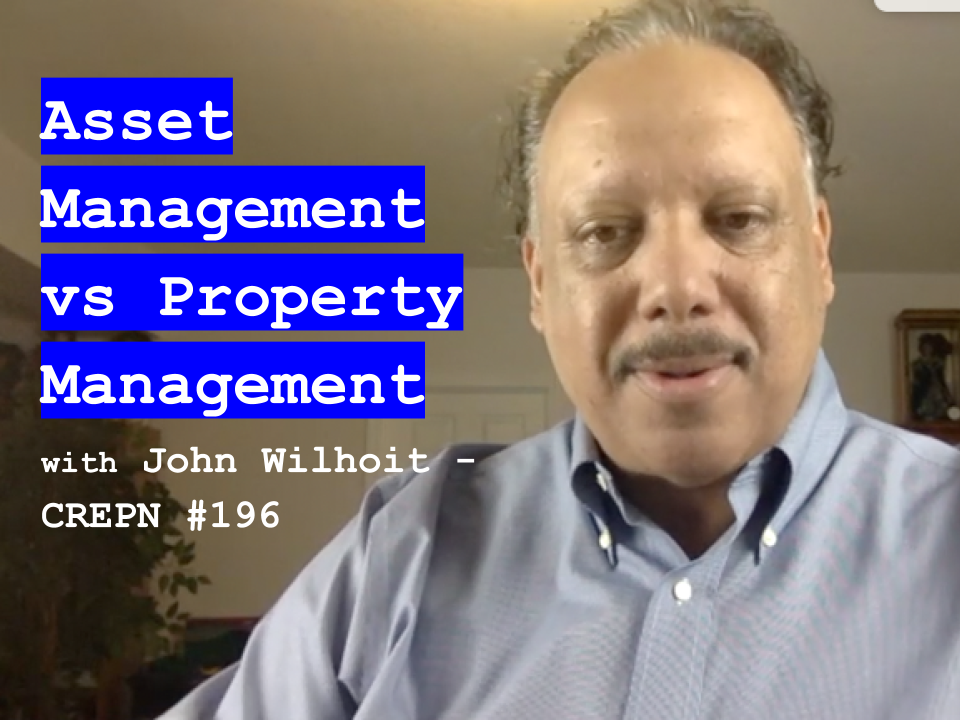
16 May Asset Management vs Property Management with John Wilhoit – CREPN #196
Asset Management vs Property Management, what is the difference?John Wilhoit is an experienced real estate investor, multifamily asset manager, author and returning guest to CREPN Radio. His true expertise is Multifamily Asset Management. In this interview John makes the distinction between Asset Management and Property Management.
In every real estate deal, there are three components. The property, people and paper. Knowing and understanding each are key to the successful operation of any property. Following is a description of each and their relation to the deal.
Property
Every property has a specific street address. In addition it is a part of the ecosystem for that neighborhood, market, city, and submarket. Additionally, it has a relation with area comparative assets and competitive assets.
People
The people are most important part. People include Asset Management, Property Management and Ownership which make up the investor people. Additionally, there are the Residents who live at the property.
Paper
The Paper that wraps around the property includes Mortgages, Leases, and Insurance Policies which are required to make the property run.
Asset Management vs Property Management
Asset Management vs Property Management, what is the relationship between them?
Asset Management
Asset Management acts a controlling feature for these three aspects; property, people and paper. By controlling these three aspects they make certain the property runs smoothly.
As the owner representative, Asset management has a role in selecting the Property Management and to assure that Property Management is doing their job properly. Asset Management will plan for, manage and monitor all properties in the owners portfolio.
Property Management
Property Management is charged with carrying out the plan set by Ownership & Asset Management. Their focus is for a specific property.
Property Management engages with the operation of the property on a day to day basis. They are there to operate the business of the multifamily asset. Responsibilities include daily maintenance, leasing, and renewals. All the things that have to occur for the property to operate optimally on a day to day basis fall under the responsibility of Property Management.
When to Hire an Asset Manager vs Property Manager
Asset Manager
The need for a professional Asset Manager becomes necessary as the portfolio grows. Their value shows up when dealing with insurance coverage, accounting, financing, capital expenditure planning and assuring the appropriate property management is on site.
If property management is not performing, it is up to the asset manager to help bring them up to speed. Too often, owners think to fire property management. If an asset manager recognizes what is missing, they can likely help get the property manager correct so that they execute ownerships plan. This is usually more efficient and less disruptive to a property as opposed to firing and starting with a new manager.
For larger value add or long term construction projects, an Asset Manager is invaluable. These projects go above and beyond the normal day to day operation of what should be handled by a property manager. If the Property Manager is assigned to manage these task, their focus on the day to day operation is compromised and can create operational problems, like delayed maintenance, turning of units, and extended vacancies.
Property Manager
For assets under $3M, the owner may be tempted to wear all three hats, Owner, Asset Manager & Property Manager. Unfortunately, for the inexperienced owner who is acting as all three roles, there is going to be trouble. As the portfolio grows so do roles become more defined.
For a property to operate at its optimal level, it is so important for the roles to be filled by professionals that know what they are doing. Multifamily is a 24 hour, 7 days a week business. It doesn’t close for holidays or weekends. It is always in operation.
If you are attempting to do this as a side gig, consider hiring a professional Property Manager. This alone will allow you to act more as an Asset Manager, where you can focus on long term business planning, capital expenditure planning, and the eventual exit from your asset.
Communication
Asset management communicates with Property management as often as needed, typically no less than weekly under normal circumstances. For capital projects the two managers will be in more frequent communication. This is necessary to plan and make certain the project is completed on time with few as possible interruptions to daily operation.
The Asset Manager will also communicate with ownership through monthly or quarterly reports. These will report on the budgets to plan, rents on competitive properties, financial condition, receivables., bad debt, vacancy, turn overs, capital budgeting, progress on any capital improvement projects, as well as exceptions. Exceptions can include reports of property damage, injuries that occur at the property and insurance claims.
Compensation
Asset Manager compensation can be structured in many different ways. A stable asset compensation package will likely be a percentage of revenue. While a value add property with significant construction budget and timeline may offer a percentage of equity due upon sale of the asset.
Property management is typically compensated as a percentage of collected rent. This varies depending on the size of the property where smaller properties will demand a higher percentage and larger properties a smaller percentage.
BIGGEST RISK
Each week I ask my guest what is the Biggest Risk they see that real estate investors face.
BIGGEST RISK: The BIGGEST RISK to any asset is complacency. Complacency is implemented by ownership when they are not engaged. Complacency from the ownership trickles down through property management, and accumulates in a poorly performing property.
How to manage the risk: Asset Management’s job is to rock the boat. Their job is to make certain the property is operating at its optimal level. They must identify and communicate with the ownership on how to better operate the property. This includes any needed capital projects and how they can improve the property’s performance.
For more go to
Website & Podcast: http://johnwilhoit.com/
Magazine: https://www.multifamilyinsight.com/
Blog: http://multifamilyinsight.net/
Prior CREPN Episodes with John Wilhoit
- Multifamily Markets Primary, Secondary & Tertiary CREPN#26 – http://traffic.libsyn.com/commercialrealestatepronetwork/show_7990797_2015_10_11_18_17_51.mp3
- Multifamily Asset Classes CREPN #64 http://traffic.libsyn.com/commercialrealestatepronetwork/show_9573429_2016_10_28_03_33_02.mp3
- Big Trends in Real Estate CREPN#106 http://traffic.libsyn.com/commercialrealestatepronetwork/JOHN_WILHOIT_8-16-17_-_82017_6.34_PM.mp3
- Rent Role Triangle: CREPN#151 http://traffic.libsyn.com/commercialrealestatepronetwork/CREPN_151_-_Rent_Roll_Triangle_with_John_Wilhoit__-_7518_5.43_AM.mp3

